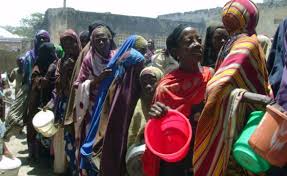'7.1m People In Nigeria, 3 Other Countries At Risk Of Food Insecurity'.
The Food and Agricultural Organisation (FAO) has said Nigeria hunger crisis has deepened the spill over into Lake Chad Basin with about 7.1 million people now faced with food insecurity.
In a statement to LEADERSHIP Weekend yesterday, it stated that the four countries affected are Cameroon, Chad, Niger and Nigeria.
It further reveals that, “The UN foresees around 120 000 people facing famine conditions in Nigeria. Of this number, the vast majority – some 96 percent are expected to be in Borno.
In Borno State alone, the population in crisis, emergency and catastrophe phases of food insecurity (Phases 3 to 5 on the five-tiered scale used by humanitarian agencies) increased from 2 million in August 2016 to 3.3 million in October-December 2016. The worst-affected in this group are not able to feed themselves and have exhausted all resources by selling off their belongings, including seeds, tools and animals. Without intervention, that number is expected to climb to 3.6 million at the height of the lean season in August 2017.
The statement revealed that some 7.1 million people are now severely food insecure across the four countries.
Among them are 515 000 children who are suffering from severe acute malnutrition – a condition which, if untreated, can lead to permanent damage to a child’s development and even death.
The statement stated that “With the next planting season starting in May, and with scarcity of animal fodder and water points during the lean season, it is crucial that crop seeds, tools and livestock support reach families urgently to limit the scope of the deepening crisis that now involves four countries: Cameroon, Chad, Niger and Nigeria.”
Furthermore it states that the FAO is among the UN agencies and governments attending the Oslo Humanitarian Conference today, organized to mobilize international funding for the crisis-struck region, where 80 to 90 percent of people rely on farming, fishing and herding for their livelihoods.
FAO’s Director of Emergency and Rehabilitation Division, Dominique Burgeon, who is representing the organisation at the conference said, “in the worst-affected areas, famine continues to loom — and millions will remain trapped in cycles of severe hunger if we don’t enable farmers to start cropping now,”
He said “Our collective efforts cannot be limited to merely avoiding massive famine – they need to allow people to return to a dignified life. And supporting agriculture is the key to both.”
Besides reducing hunger and boosting nutrition, investing in farmers also provides much needed job opportunities that reduce migration and limit the potential for radicalization of unemployed youth, Burgeon said.
Violence related to the armed group Boko Haram in northeastern Nigeria has spilled over to parts of neighboring countries in the Lake Chad Basin – specifically, Cameroon’s Far North, western Chad and southeastern Niger – with devastating effects on food security and livelihoods.
With the Lake Chad Basin approaching a critical period in the agricultural calendar, FAO is urgently calling for $30 million in immediate emergency support to help farming families in the four countries get ready to plant in the upcoming May planting season and prevent them from slipping into long-term dependency on food aid.
A total of $232 million will be needed to secure food production and access to food for three million people in the worst-hit areas over the next three years it said . The vast majority of the requested funds – some $191 million – is designated for Nigeria, which is bearing the brunt of the crisis.
Violence has driven millions across the four countries from their homes and hampered access to agricultural lands and assets, creating massive humanitarian needs in an area already struggling with food insecurity, poverty and environmental degradation.
source: Leadershipng


Comments
Post a Comment